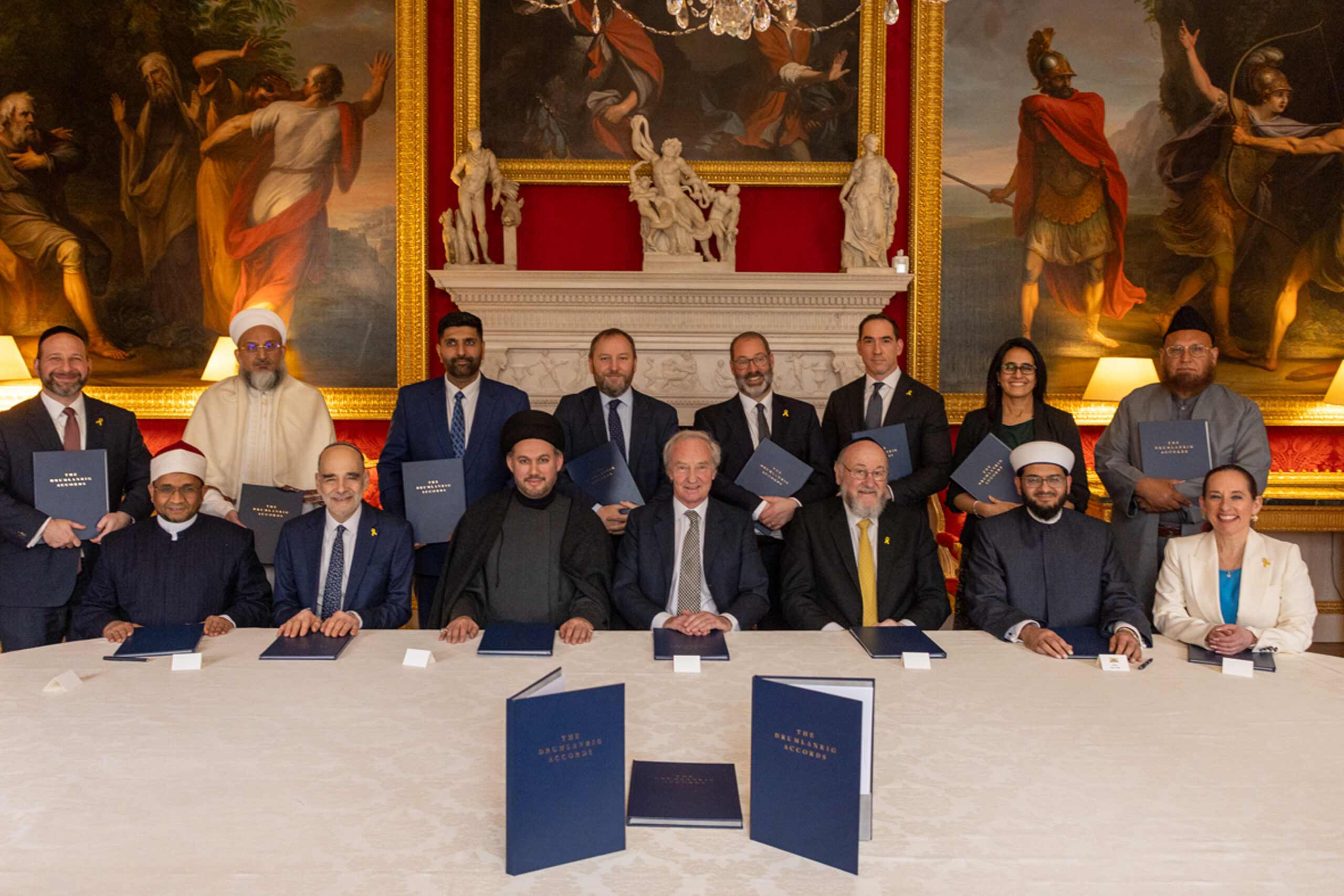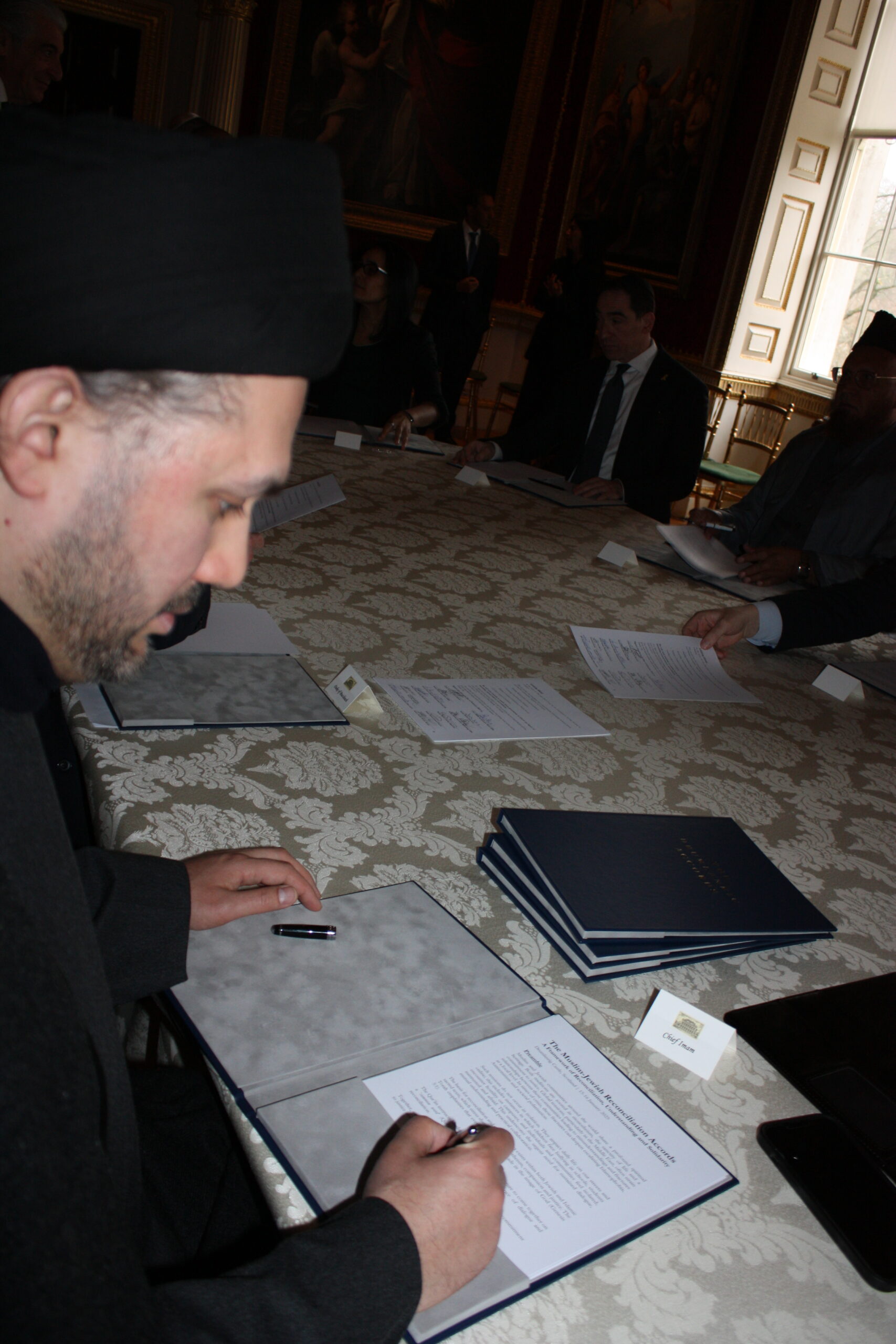
In February, eleven senior Muslim and Jewish leaders signed the Drumlanrig Accord—an interfaith agreement establishing a framework for sustained dialogue and shared responsibility between two of Britain’s most affected minority communities. Launched at Spencer House and presented to His Majesty King Charles III at Buckingham Palace, the Accord has drawn both praise and criticism. In this commentary, Imam Dr Sayed Razawi, who led the initiative, responds to concerns about its purpose and timing, and reflects on what meaningful engagement across difference demands in today’s Britain.
Imam Dr Sayed Razawi (Scotland)
In an increasingly fragmented public sphere, Britain’s minority communities are facing a decision that will shape our national fabric for decades to come. We can retreat into isolation, speak only within the comfort of familiar circles, or we can commit to principled engagement—even with those whose views may challenge our own. The accords recently signed between senior Jewish and Muslim leaders represent the third—and most necessary—path.
This initiative does not collapse theological or political distinctions. On the contrary, it acknowledges that difference is inevitable—and even healthy—in a democratic society. What it refuses is for those differences to become a pretext for suspicion, hatred or silence.
The accords, signed at Drumlanrig, brought together leading voices from both communities—Orthodox and Progressive rabbis, Sunni, Shia, Ismaili and Bohra imams—alongside civic leaders, in an effort to build respectful, sustained channels of communication. The goal is not consensus, but cohesion. These agreements provide a framework for addressing misrepresentation, raising concerns, and de-escalating tensions before they erupt. They are not about geopolitics. They are moral commitments to coexist within our shared home: Britain.
These accords are civic in nature, focused on how two minority communities can live alongside one another within a majority culture that may not always be closely acquainted with their traditions and ways of life. To many outside faith traditions, ongoing tensions between Jews and Muslims—both of whom trace their belief to a shared Abrahamic monotheism—can obscure the ethical and spiritual truths of that heritage.
This perceived disunity risks reinforcing a broader detachment from belief in the One God. Men, women, children, the elderly, professionals and the unemployed in both communities often feel powerless in the face of events in the Middle East. It is vital to reaffirm that disagreement does not have to mean division. For the sake of national cohesion, we must allow for principled disagreement without rupturing the social fabric.
Central to this effort is the recognition that dialogue serves as a powerful remedy to deep-rooted misunderstandings.
Many harmful preconceptions have taken hold precisely because of a lack of communication—leading some to wrongly assume that Muslims are inherently bigoted or antisemitic, and similarly, that Jews are Islamophobic. Through sustained, honest conversation, these false narratives can be dismantled, allowing us to see one another not as adversaries but as neighbours sharing common hopes and fears.
This dialogue is not about elevating minority voices at the expense of the majority, but about building mutual respect that strengthens society as a whole. Difference is not a threat but a source of strength—ignorance and hostility are. Principled engagement encourages us to understand opposing views and build respect that transcends division without erasing identity.
The urgency is real. Antisemitic incidents in the UK surpassed 3,500 last year—according to the Community Security Trust, the second-highest annual figure on record. Islamophobic assaults, meanwhile, rose by 73%, according to Tell MAMA. These are not just statistics—they reflect a deepening climate of fear, especially for women, children, and the elderly.
The Southport stabbing in July 2024 showed how quickly misinformation can inflame community tensions. False social media claims wrongly identified the suspect as a Muslim immigrant. In reality, the attacker was born in Cardiff and had no ties to Islam or immigration.
Within hours, anti-Muslim protesters gathered outside Southport Mosque, throwing objects and chanting slogans. In the days that followed, Islamic centres in Aberdeen, Manchester and East London were vandalised.
Jewish communities have suffered too. Synagogues have ramped up security in response to threats. Jewish schools and cemeteries have been targeted. Attacks are often in daylight, and frequently met with silence. When both Muslims and Jews in Britain feel unsafe, something fundamental in our society has gone awry.
It is in this context that the Drumlanrig Accords must be understood. They are not abstract statements of goodwill but structured responses to a worsening civic reality. The premise is simple: if we do not engage in dialogue with one another, our stories may be shared by those less familiar with our experiences, which can lead to misunderstandings.
Islam teaches us to safeguard the vulnerable, to act with justice, and to respond to fear not with indifference, but with clarity and compassion. That responsibility extends beyond our own community. When others fear us—rightly or wrongly—we must engage. Silence is not neutrality; it is abdication.
Minority communities typically respond to social tension in one of three ways. The first is disengagement—leaving the public square altogether. But this means our stories may be shared by those less familiar with our faith, which can lead to misunderstandings. In France, such withdrawal from national debates on secularism contributed to legislation restricting religious dress and impacting civil society.

[Photo: Imam Sayed Razawi signing the Accord in Spencer House, London. Photographer: Ahmed J Versi/ The Muslim News]
In Canada, limited Muslim engagement during debates on Quebec’s Bill 21—a law banning public servants from wearing religious symbols—allowed legislation that disproportionately affects Muslim women and Sikh men to pass largely unchallenged.
The second response is selective engagement—remaining in echo chambers. This deepens polarisation. It limits exposure to other perspectives, entrenches stereotypes, and obstructs trust.
The third path is principled engagement: being willing to sit with others, including those we disagree with, to find common ground and defuse tensions before they erupt.
These conversations are only the beginning. Similar engagement is needed between Muslim and Hindu communities to avoid the kind of tensions seen in Leicester in 2022. Those disturbances were not isolated — they were amplified by external narratives and online misinformation. We must not allow them to take root here.
We should also be honest about the stakes. Fringe elements on all sides thrive in climates of silence and mistrust. They feed on disconnected communities. Engagement is not a luxury—it is a shield.
The Drumlanrig Accords do not ask us to deny difference. They ask that our differences not be used to sow fear. For Muslims and Jews in Britain today, there is far more that unites us than divides us: the desire for safety, for dignity, and for a future in which our children do not inherit our divisions.
This is the Britain we must build—through leadership, dialogue, and the quiet courage of those willing to sit across the table and say: I may not agree with you, but I will not give up on you.
Notice: This article does not appear in the PDF flip-through edition of this issue